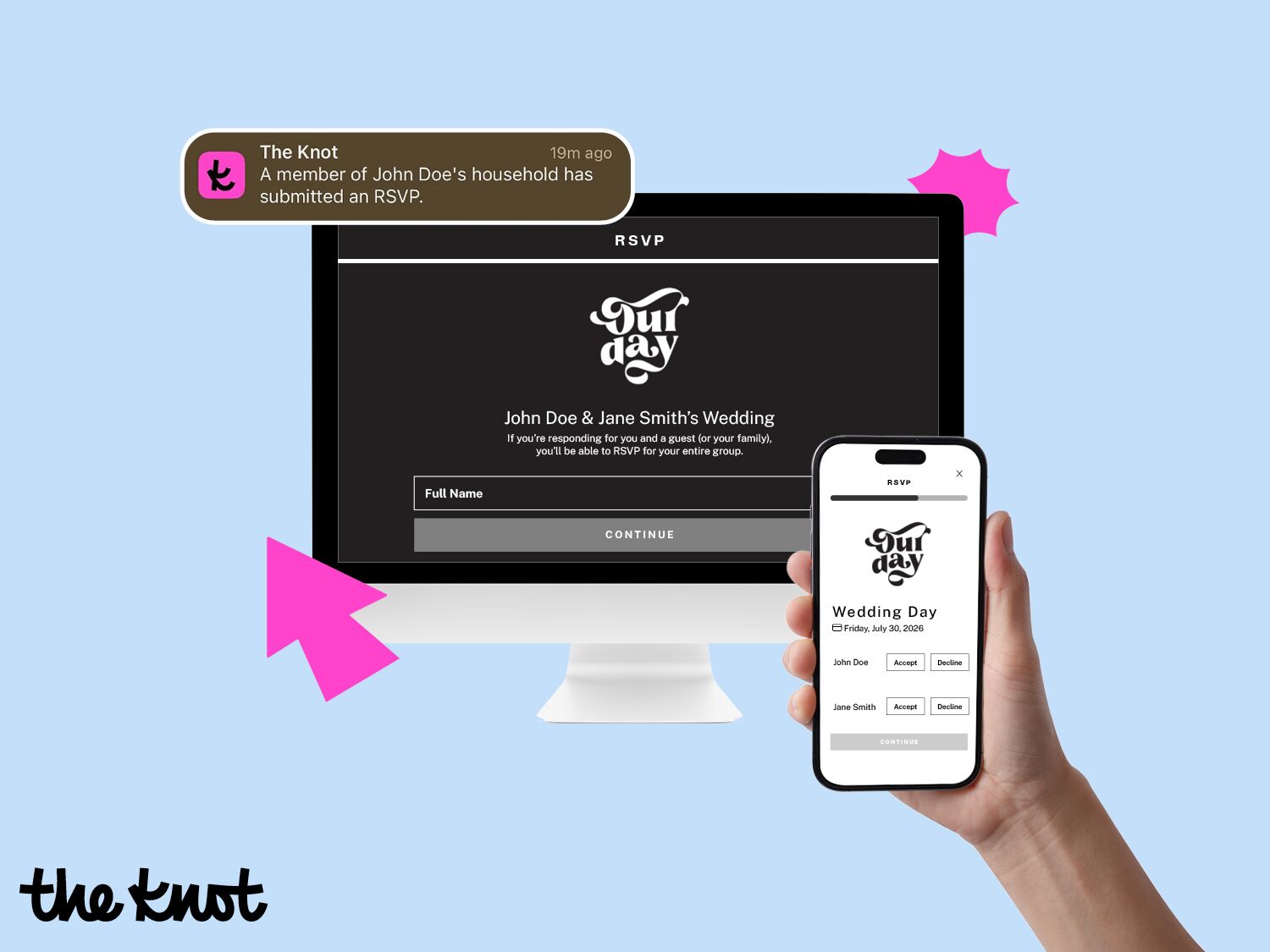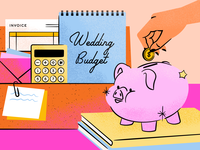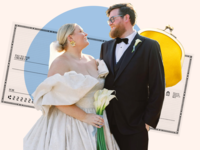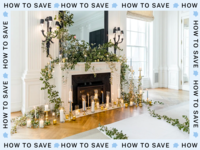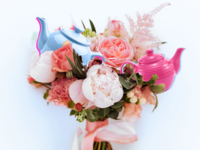Experts Dish on the Dos and Don'ts of a DIY Wedding

If you're a creative and crafty person, I get it, you probably want to dip your toes into DIY wedding projects. But here's the thing, these are some important dos and don'ts for DIY weddings that you need to understand before heading to the craft store. Plus, did you know that DIY wedding projects won't necessarily save you money on your wedding budget?
Below, we're diving into DIY wedding red flags to be aware of plus tips on how to do DIY correctly. We tapped a few expert wedding planners to get the insider scoop on how to approach a DIY wedding the right way. Khanh P. Duong is a bilingual wedding coordinator and owner of her eponymous SoCal-based business. Wedding planner and designer Sofia Ocampo is the owner and lead planner of Events by Sofia in Atlanta, Georgia. Kelly McWilliams is a wedding planner and owner of her namesake planning company based in Florida. Read on to see what the pros have to say about the right (and wrong) way to DIY a wedding.
DIY wedding advice in this story: Definition | Setup | What to Avoid | What to Do | DIY Decor | DIY Stationery | Saving Money | Common Mistakes
What Does DIY Wedding Mean?
A DIY wedding is a do-it-yourself wedding where the couple handles some or all of the wedding preparation and details themselves. A fully DIY wedding is one where to-be-weds don't hire a wedding planner or designer to oversee all the wedding details. A fully DIY wedding is generally discouraged. Meanwhile, a partial DIY wedding is one where only a few minor details are handled by the nearlyweds.
Who Sets Up DIY Wedding Elements?
As the term DIY suggests, a do-it-yourself wedding is handled by the to-be-weds. However, the morning of the wedding you and your partner will need to be getting ready rather than dedicating time to setting up. This is why a fully DIY wedding is generally not advisable. "Bringing a vision to life and executing it is more difficult than it seems, which is why hiring an experienced vendor team is the best way to ensure the wedding is a success," notes Ocampo.
Don't Make Assumptions
While some friends, family members and wedding party attendants may be willing to offer their assistance with wedding details and setup, you shouldn't make any assumptions during wedding planning about who will or won't help. Ultimately, when you forgo professional vendors, the onus is on you to handle tasks. You invited your wedding guests to attend the event, but you didn't hire them to work it. If you want to enlist the help of loved ones, approach the topic from a place of asking for help and making it clear their contribution is optional.
Remember Clean-Up Duties
What goes up, must come down. When the last dance is over and you and your partner say goodbye in your getaway car, who is going to clean everything up? In the absence of full-service wedding vendors, you are putting a lot of responsibility on loved ones who will be tired and ready for sleep. But even if you DIY just a small detail, like a card box, make sure you delegate a specific person to take that item home at the end of the night.
What Not to DIY for Your Wedding
The core details of your wedding should be left to the professionals. As Ocampo explains, "Any major element of the wedding is not something we encourage our clients or their families to DIY. It is one of the most special days of their lives and the last thing we want is for them to be stressed or for their DIY project to not match their expectations."
Duong agrees, adding that complex tasks and critical services should be DIYed. "Avoid taking on tasks that require specialized skills, expertise, or equipment, such as intricate floral designs or professional-level photography and videography. It's best to leave essential services like catering, photography, and music/lighting production to experienced professionals to ensure quality and reliability."
McWilliams explains that when approaching the question of whether or not to DIY, you need to avoid anything that "could compromise the integrity of your event." She also emphasizes that tasks that have to happen right before the wedding aren't good to DIY. "The last month of your wedding there are so many details you'll be responsible for that you don't want to end up stressed and wishing you hadn't started."
- Photography and Videography: Uncle Joey that likes to take nature pictures on family vacations? Yeah, he isn't a professional wedding photographer and shouldn't be tapped as such for the wedding.
- Wedding Cake: Baking a cake for an intimate birthday dinner is not the same as creating a large-scale wedding cake with top-notch decorations. When it comes to your wedding cake, it's best to leave it to professional bakers.
- Flowers: Just because you like having fresh-cut flowers on the dining room table doesn't make you a professional wedding florist. There's a lot of work that goes into sourcing flowers, producing designs, and keeping them in pristine condition before the wedding—all of which should be handled by pros.
- Music: You might be great at making road trip playlists, but that doesn't make you a DJ. Musical professionals, from DJs to live bands and ceremony ensembles, are trained for big events. They know how to roll with the punches, read the room, and still curate an amazing auditory experience. Trust them, they're worth the investment.
- Fashion Alterations: While you may be a hobby sewist, it's best to leave the alterations for your wedding day attire to the pros.
- Catering and Cake: Cooking for a backyard dinner party with 10 of your closest friends may be something you enjoy. However, that is a far cry from catering, or baking a cake, for your own wedding. Trust us, hire a professional caterer and baker for your wedding menu.
- Hair & Makeup: Swiping on some lipstick for a date night isn't the same as prepping for your wedding look. Once again, leave the glam to beauty pros.
What to DIY for Your Wedding
Now that you know which DIY wedding projects to avoid, let's look at what you can DIY for the wedding. McWilliams offers some great advice: "Remember that semi-DIY counts. There isn't a rule that you have to DIY from scratch."
McWilliams adds that couples should "DIY only things that are add-ons for your wedding–nothing that you absolutely need and require for your wedding to take place successfully." Ocampo agrees and says that "where a DIY project can be successful, is when it is a small, but personal component for the wedding."
- Card Box and Guest Book: If your crafty Aunt June is itching to participate in the wedding, consider tasking her with something simple like making a card box or sourcing a guest book. These kinds of minor tasks are easy to delegate and are relatively low-risk so you don't need to worry about things going majorly awry as a result.
- Favors: Favors are another area where DIY can be a fun option. "Handmade favors, such as homemade candles or baked goods, can be a thoughtful touch for guests," says Duong.
- Photo Booth Props: While your photo booth vendor will come with a variety of props, you can also DIY a few custom, personalized ones if you want to take your photo booth over the top. Duong encourages to-be-weds to "create fun props and a backdrop for guests to capture memorable moments."
- Wedding Website: Your website is an important wedding component and something that you can easily DIY. "I highly recommend designing a wedding website that can provide guests with important details and updates," shares Duong.
- Welcome Bags and Guest Amenities: DIY fans and DIY confetti cones for wedding ceremonies are two great examples of simple DIY projects that can be fun for couples and have minimal risk.
Should You DIY Your Decor?
Here's the thing: Can you and should you DIY your wedding decor are two very different discussions. Pros generally agree that decorative accents and minor decor elements can be DIYed while the big hitters are best left to the pros.
For example, Ocampo notes that if you are well-versed in a specific field or skill, then there may be ways to weave that into your decor. "As long as it is not a major component of the wedding, we do love these small, personal touches," says the pro. "For example, we had a bride who was excellent at embroidery and monogrammed her own estate table napkins. We also had a groom who worked for a major newspaper and designed a crossword puzzle for guests to complete during cocktail hour." Similarly, McWilliams suggests that a to-be-wed could "consider creating a single large silk flower arrangement that can be placed on the back of your bar at cocktail hour and then saved in your home. Then it can become something that can be treasured forever." However, beyond these small decorations, pros highly recommend booking a talented florist and/or event designer.
Should You DIY Your Stationery?
Similar to DIY wedding decor, DIY stationery is a case of "yes, but…" that you need to take time to consider wisely. While you can DIY your wedding stationery, there are some significant drawbacks to be aware of before taking the plunge.
Notably, when you forgo a professional, "there's a risk of compromising on quality," says Duong. "Cheaper materials or rushed craftsmanship could result in subpar outcomes, which may not align with your vision for the wedding. In some cases, paying for professional services ensures a higher standard of quality and reliability." Along the lines of quality, typos are a specific risk with stationery.
"Typos are for sure the most common mistakes we've seen," says McWilliams. "Some worse than others. Especially with seating charts and escort cards. Imagine if you accidently typed table 9 instead of 19 on your seating chart but then the place cards were the opposite! Then you have 20 people trying to sit at the same table and you're short an entire table, chairs, centerpiece and tablecloth." Yikes!
One approach that you can consider is to partially DIY your stationery needs. Notably, you could do all the stuffing and assembly yourself. "You can also do some DIY to save solely on labor costs, like assembling, stuffing and mailing your invitations versus having your stationer designer do it," suggests McWilliams. The pro also shares that for artistic to-be-weds you could work with a professional stationer to incorporate a DIY sketch or painting "that can then be professionally scanned and used on your save the date, ceremony program or even an envelope liner. Some of the best DIY projects I've seen involve art."
Does DIY Save Money?
If you're wondering how to plan an affordable wedding, DIY isn't always the best solution. According to Ocampo, "Contrary to popular belief, DIYing aspects of your wedding does not typically result in money saving. When all is said and done, the time spent and supplies purchased, end up costing more than one thinks. Not only that, but oftentimes, clients are disappointed with the results and regret not bringing on an experienced professional from the beginning."
DIY is Not Necessarily Less Expensive
"While DIY projects can help save money on certain aspects of the wedding, it's essential to weigh the cost of materials, time, and potential mistakes against the savings," says Duong. "In some cases, opting for DIY may not always be the most economical choice, especially for complex or time-consuming tasks that can be reallocated to something else.
Consider All Types of Costs
Underestimating costs is a common occurrence with DIY weddings.
"DIY projects can sometimes end up costing more than anticipated due to hidden expenses or mistakes along the way," admits Duong. "From supplies and tools to labor, there are a lot of factors that contribute to price quotes you receive from vendors. And while DIY may help you save money in some areas, you run the risk of spending even more in other areas."
McWilliams concurs: "Depending on the project you may save on labor costs if you're bypassing a creative vendor. You may be paying more than you expected to with the tangible pieces though. Absolutely research the costs for all the elements needed to be complete through execution."
Time is Money
"DIY projects require time for planning and preparation, from researching ideas and gathering materials to creating a timeline for execution," says Duong. The pro encourages couples to factor in brainstorming and troubleshooting time. "The actual execution can be time-consuming, especially if they involve intricate details or repetitive tasks. Be realistic about how much time each project will take and allocate sufficient resources to complete them without feeling rushed or stressed." Despite careful planning, DIY projects may still encounter unforeseen delays. "Building in buffer time allows flexibility to address these challenges without compromising on the overall wedding timeline," says Duong.
Common Mistakes With DIY Weddings
While DIY projects can be a fun and creative way to personalize your wedding, nearlyweds should keep these common DIY mistakes in mind when weighing the pros and cons.
- Lack of communication
- Making assumptions regarding the scope of projects
- Not delegating clean-up tasks
- Treating loved ones as free labor
- Overcommitting
- Procrastination
"Ultimately, the decision to DIY aspects of your wedding should align with your preferences, resources, and comfort level with taking on additional responsibilities," says Duong.

